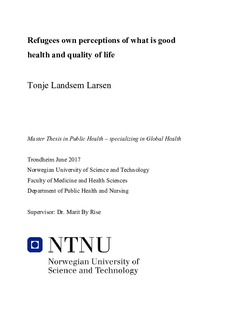| dc.description.abstract | Background: Immigration into Norway has been increasing the last years and will continue to increase over the years to come. There is an ongoing shift in the society when it comes to culture and ethnicity, where the diversity is getting bigger. A large part of the population are refugees who are a vulnerable group. This part of the population may need different adjustments in society to utilize the services in line with the rest of the population.
To offer the best possible services for all, we need to have knowledge about the different cultures´ perceptions regarding health and quality of life. This can provide valuable knowledge that can be useful in the further development of a multicultural society that is accessible for everyone. By knowing more about other ethnic groups views on health and quality of life, we may easier help them in the process of integration in Norway.
Purpose: The purpose of the study was to explore refugees´ personal perception of what is good health and quality of life.
Material and methods: This was a qualitative study based on semi-structured in-depth interviews and the analysis was facilitated using systematic text condensation as modified by Malterud. Eleven refugees were recruited from one asylum reception center in mid-Norway. The informants were originated from Iraq, Kurdistan, Eritrea, Afghanistan, Iran and Syria.
Results: Perceptions of good health and quality of life was expressed in several different aspects. Physical activity, work, language, social network and access to health services were the ones that stood out as crucial to have a good quality of life. To feel safe and as part of society was also described as important. Experiences from the past and the uncertain situation the participants lived under now had a huge impact on their quality of life and their health situation. To have a good mental health was described as important in this situation, and it was described that there was a clear link between health status and quality of life.
Conclusion: This study gives knowledge about refugees´ perceptions of good health and quality of life. The results correspond to earlier research on factors important for maintaining good health, which is physical activity, work, language, social network and access to health care. Findings also suggest that feeling safe and as a part of society was important elements for the participants´ quality of life and health situation. Regarding the integration process in Norwegian society, this study has shown that one should focus more on linguistic proficiency, early employment, and social networking among the refugees. | nb_NO |
